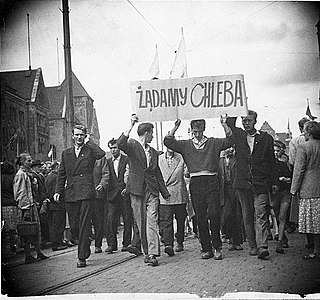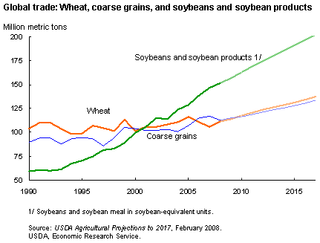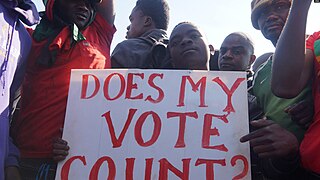Related Research Articles

Burkina Faso is a landlocked country in West Africa. It covers an area of 274,223 km2 (105,878 sq mi), bordered by Mali to the northwest, Niger to the northeast, Benin to the southeast, Togo and Ghana to the south, and Ivory Coast to the southwest. As of 2021, the country had an estimated population of 23,674,480. Previously called the Republic of Upper Volta (1958–1984), it was renamed Burkina Faso by President Thomas Sankara. Its citizens are known as Burkinabè, and its capital and largest city is Ouagadougou.

Blaise Compaoré is a Burkinabé-Ivorian former politician who served as the second president of Burkina Faso from 1987 to 2014. He was a close associate of the first president, Thomas Sankara, during the 1980s and in October 1987 he led a coup d'état during which Sankara was killed. Subsequently, he introduced a policy of 'rectification', overturning the leftist and Third Worldist policies pursued by Sankara. He won elections in 1991, 1998, 2005, and 2010, in what were considered unfair circumstances. His attempt to amend the constitution to extend his 27-year term caused the 2014 Burkinabé uprising. On 31 October 2014, Compaoré resigned, whereupon he fled to the Ivory Coast. In April 2022, he was found guilty by a special military tribunal of complicity in Sankara’s murder. He is also the longest-serving president of Burkina Faso.

The Romanian revolution was a period of violent civil unrest in Romania during December 1989 as a part of the revolutions of 1989 that occurred in several countries around the world, primarily within the Eastern Bloc. The Romanian revolution started in the city of Timișoara and soon spread throughout the country, ultimately culminating in the drumhead trial and execution of longtime Romanian Communist Party (PCR) General Secretary Nicolae Ceaușescu and his wife Elena, and the end of 42 years of Communist rule in Romania. It was also the last removal of a Marxist–Leninist government in a Warsaw Pact country during the events of 1989, and the only one that violently overthrew a country's leadership and executed its leader; according to estimates, over one thousand people died and thousands more were injured.

The 1956 Poznań protests, also known as Poznań June, were the first of several massive protests against the communist government of the Polish People's Republic. Demonstrations by workers demanding better working conditions began on 28 June 1956 at Poznań's Cegielski Factories and were met with violent repression.

The protests of 1968 comprised a worldwide escalation of social conflicts, which were predominantly characterized by the rise of left-wing politics, anti-war sentiment, civil rights urgency, youth counterculture within the silent and baby boomer generations, and popular rebellions against state militaries and bureaucracies.

The June 1976 protests were a series of protests and demonstrations in the Polish People's Republic that took place after Prime Minister Piotr Jaroszewicz revealed the plan for a sudden increase in the price of many basic commodities, particularly food. Prices in Poland were at that time fixed, and controlled by the government, which was falling into increasing debt.

The 2008 Cameroon protests were a series of violent demonstrations in Cameroon's biggest cities that took place from 25 to 29 February 2008. The protests followed on the heels of a strike by transport workers, who were opposing high fuel prices and poor working conditions. Further political turmoil had been caused by President Paul Biya's announcement that he wanted the constitution to be amended to remove term limits; without such an amendment, he would have to leave office at the end of his term in 2011. Large groups of youths, whom the opposition Social Democratic Front (SDF) political party and the government blame one another for organising, took to the streets of Douala, Yaoundé, Bamenda, and other major cities, looting and vandalising property. The government sent in troops to crack down on the unrest, and protesters and troops alike were killed. The official government tally is that 40 people were killed, but human rights groups claim that the total is closer to 100. Government figures place damage to property at tens of billions of francs CFA.

World food prices increased dramatically in 2007 and the first and second quarter of 2008, creating a global crisis and causing political and economic instability and social unrest in both poor and developed nations. Although the media spotlight focused on the riots that ensued in the face of high prices, the ongoing crisis of food insecurity had been years in the making. Systemic causes for the worldwide increases in food prices continue to be the subject of debate. After peaking in the second quarter of 2008, prices fell dramatically during the late-2000s recession but increased during late 2009 and 2010, reaching new heights in 2011 and 2012 at a level slightly higher than the level reached in 2008. Over the next years, prices fell, reaching a low in March 2016 with the deflated Food and Agriculture Organization (FAO) food price index close to pre-crisis level of 2006.

The United Front for Democracy Against Dictatorship (UDD), whose supporters are commonly called Red Shirts, is a political pressure group opposed to the People's Alliance for Democracy (PAD), the 2006 Thai coup d'état, and supporters of the coup. Notable UDD leaders include Jatuporn Prompan, Nattawut Saikua, Veera Musikapong, Jaran Ditapichai, and Weng Tojirakarn. The UDD allies itself with the Pheu Thai Party, which was deposed by the 2014 military coup. Before the July 2011 national elections, the UDD claimed that Abhisit Vejjajiva's government took power illegitimately, backed by the Thai Army and the judiciary. The UDD called for the Thai Parliament to be dissolved so that a general election could be held. UDD accused the country's extra-democratic elite—the military, judiciary, certain members of the privy council, and other unelected officials—of undermining democracy by interfering in politics. The UDD is composed of mostly rural citizens from northeast (Isan) and north Thailand, of urban lower classes from Bangkok, and of intellectuals. Although the movement seems to receive support from former prime minister-in-exile Thaksin Shinawatra, not all UDD members support the deposed prime minister.

The Cochabamba Water War, also known as the Bolivian Water War, was a series of protests that took place in Cochabamba, Bolivia's fourth largest city, between December 1999 and April 2000 in response to the privatization of the city's municipal water supply company SEMAPA. The wave of demonstrations and police violence was described as a public uprising against water prices.

The Jordanian protests were a series of protests in Jordan that began in January 2011, and resulted in the firing of the cabinet ministers of the government. In its early phase, protests in Jordan were initially against unemployment, inflation, corruption. along with demanding for real constitutional monarchy and electoral reforms.

The 2011–2013 protests in Sudan began in January 2011 as part of the Arab Spring regional protest movement. Unlike in other Arab countries, popular uprisings in Sudan had succeeded in toppling the government prior to the Arab Spring in 1964 and 1985. Demonstrations in Sudan however were less common throughout the summer of 2011, during which South Sudan seceded from Sudan, but resumed in force later that year and again in June 2012, shortly after the government passed its much criticized austerity plan.
The 2011 Burkina Faso protests were a series of popular protests in Burkina Faso.

The 2014 Burkina Faso uprising was a series of demonstrations and riots in Burkina Faso in October 2014 that quickly spread to multiple cities. They began in response to attempts at changing the constitution to allow President Blaise Compaoré to run again and extend his 27 years in office. Pressure for political change came from civil society and in particular from the country's youth. Following a tumultuous day on 30 October, which included the involvement of former Defence Minister Kouamé Lougué and the burning of the National Assembly and other government buildings as well as the ruling Congress for Democracy and Progress party's headquarters, Compaoré dissolved the government and declared a state of emergency before eventually fleeing to Côte d'Ivoire with the support of Ivorian President Alassane Ouattara.

The Tunisian bread riots were a series of violent demonstrations in Tunisia that occurred from December 1983 to January 1984, triggered by a rise in the price of bread due to an IMF-imposed austerity program. President Habib Bourguiba declared a state of emergency and the riots were put down by force. Over 100 rioters died. The regime was weakened by the upheavals and the aftermath of food riots. Three years later General Zine El Abidine Ben Ali seized power in a coup.

The 2019 Malawian protests were a series of nationwide rallies and strikes about government pensions, the results of the 2019 Malawian general election and demands for democratic reforms. Anti-presidential unrest was met with police violence against demonstrators. Soon, they used live rounds, tear gas and batons to disperse protesters who protested for three months against the president.
The 2007–2008 Senegalese protests were ongoing opposition protests and civil demonstrations, riots and strikes in Senegal over many issues. One of the main issues were deteriorating economic conditions and food price hikes due to the 2007–2008 world food price crisis. Hundreds attended rallies from January, March and September, before the biggest wave of protests. Demonstrators were met with bullets and tear gas. Water cannon was also shot at demonstrators demanding democratic reforms and justice from the government, yet the resignation of president Abdoulaye Wade. Thousands threw stones on demonstrators in November 2007, after a week-long uprising and bloody crackdown nationwide. Clashes between protesters and security forces, who launched strike action. After protests in December, protests calmed and ceased for 2–3 months until March–April 2008 when tanks was deployed after opposition protests and food riots in Dakar. Four people were killed in the uprising and ensuing clashes. Violent protests rocked the country until 28 April 2008, when two demonstrators were killed in clashes.
The 1990–1992 movement in Madagascar was a strike movement and popular uprising that rocked Madagascar demanding free results of elections, new constitution and shared their dissatisfaction with the government in Madagascar which led to elections and the fall of the government in 1990–1992.
The 1996 Jordanian protests were mass protests and riots in Jordan for 2–4 weeks in August–September against new International Monetary Fund-led reforms, leading to bread-price hikes and despite economic troubles, the government of Prime Minister Abdul Karim Kabariti increased food prices and basic good prices hiked, sparking rioting in Karak and spread to Ma’an, Zarqa, Amman, Madaba and other southern cities, where poverty is high.
References
- ↑ "Burkina Faso: Protests on price rises spread to the capital". RefWorld. 28 February 2008.
- ↑ "Burkina Faso: Protests Spread to Capital". NewYorkTimes. February 29, 2008.
- ↑ "Protest wave reaches Burkina Faso". Afrol News. 15 March 2008.